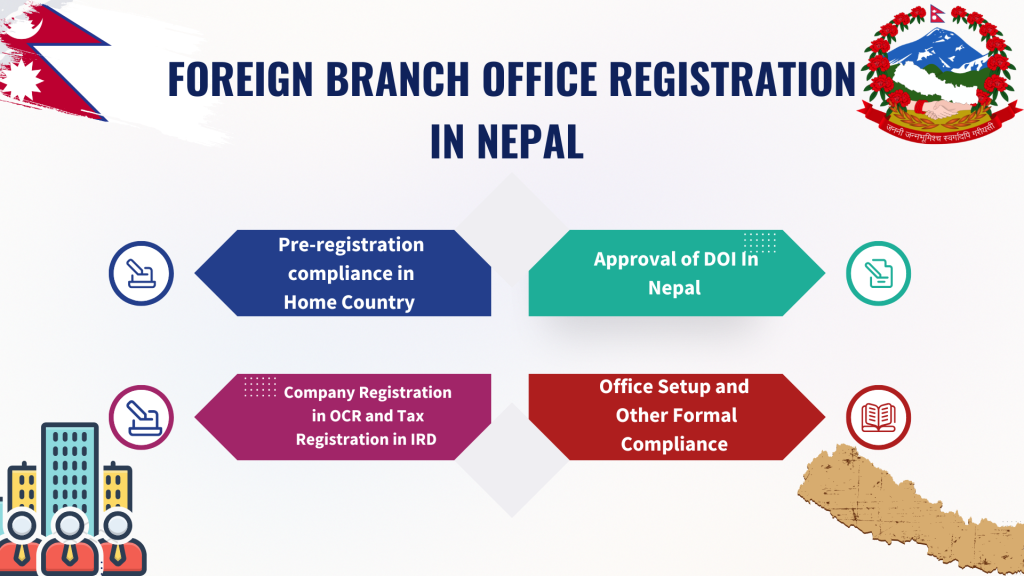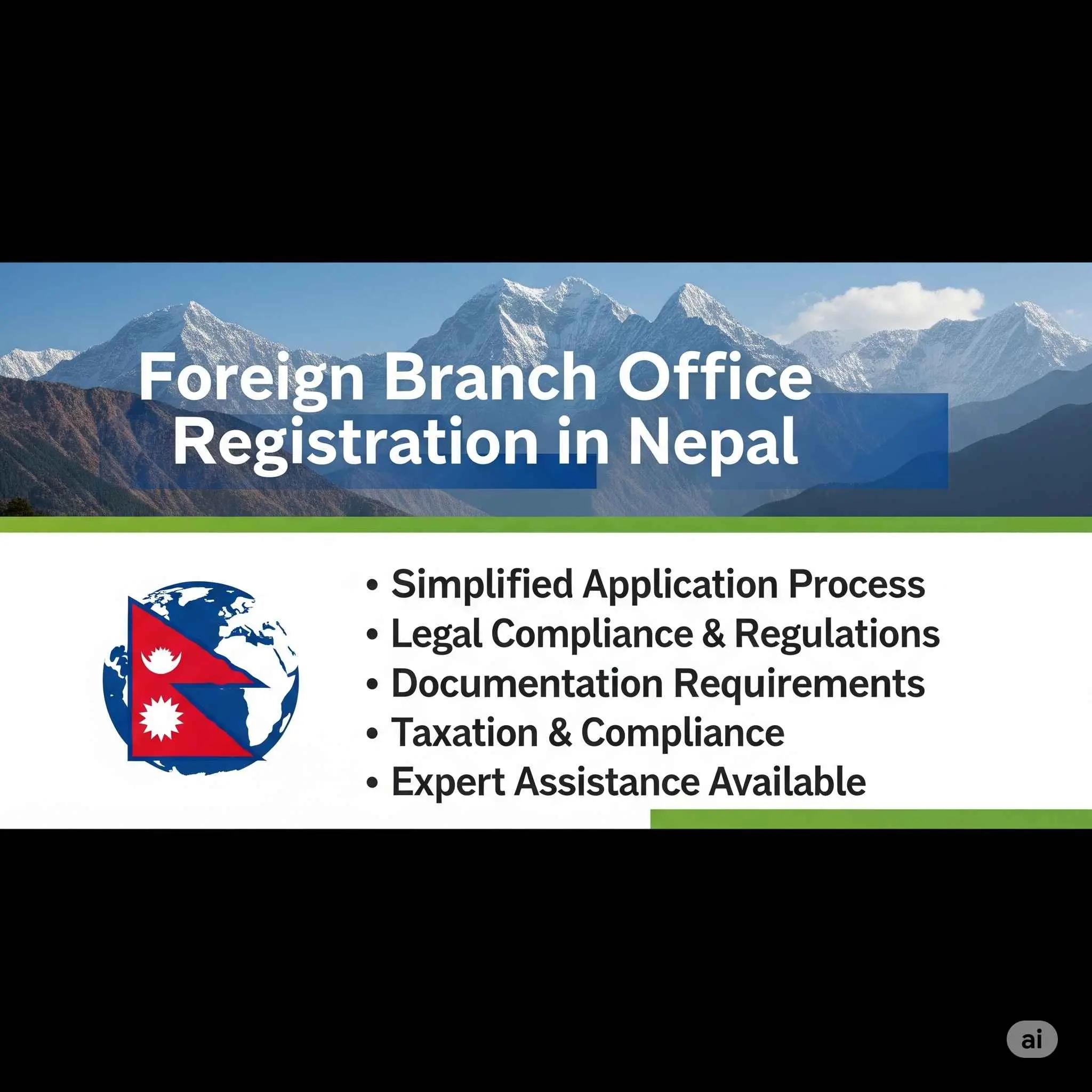Table of Contents
Branch Office Registration in Nepal | How to setup Foreign Branch Office in Nepal
Foreign Branch Office Registration Nepal represents a strategic entry point for international companies seeking to establish operations in Nepal’s growing economy. This comprehensive guide provides detailed insights into the legal framework, registration process, compliance requirements, and strategic considerations for establishing a branch office Nepal under the prevailing laws.
Legal Framework Governing Foreign Branch Office Registration Nepal
The registration of Foreign Branch Office Registration Nepal is primarily governed by the Companies Act, 2006 (2063), specifically Section 154 and Section 155. Additional regulatory frameworks include the Foreign Investment and Technology Transfer Act (FITTA), 2019, Industrial Enterprises Act, 2020, and guidelines from the Nepal Rastra Bank for financial institutions.
The Office of Company Registrar (OCR) serves as the competent authority for Foreign Branch Office Registration Nepal, ensuring compliance with all legal requirements while facilitating business operations for foreign entities.
What is a Branch Office in Nepal?
A branch office Nepal is defined as an extension of a foreign parent company operating within Nepalese territory. Unlike subsidiary companies, a branch office Nepal does not possess separate legal personality and functions as a direct extension of the parent company. This structure allows foreign businesses to maintain centralized control while establishing operational presence in Nepal.
Foreign Branch Office Registration Nepal becomes mandatory when a foreign company conducts business activities in Nepal for a continuous period of one month or more through an established office or appointed representative.
Step-by-Step Process for Foreign Branch Office Registration Nepal

Step 1: Pre-Registration Preparation
Before initiating Foreign Branch Office Registration Nepal, foreign companies must:
- Obtain necessary approvals from home country regulators
- Prepare required documentation with proper attestation
- Secure office premises in Nepal
- Appoint authorized representatives
Step 2: Government Authority Approval
Foreign Branch Office Registration Nepal requires approval from the concerned government authority relevant to the business sector. This typically involves:
- Submission of application to the Department of Industry (DOI)
- Providing detailed business plan and investment proposal
- Demonstrating sector-specific requirements compliance
Step 3: OCR Submission and Review
The core Foreign Branch Office Registration Nepal process involves:
- Submission of complete application to Office of Company Registrar
- Review of documentation for legal compliance
- Evaluation of business viability and regulatory requirements
Step 4: Registration Certificate Issuance
Upon successful review, OCR issues the branch office registration certificate, officially authorizing operations in Nepal. This typically takes 30-45 days from application submission.
Step 5: Post-Registration Compliance
Following Foreign Branch Office Registration Nepal, companies must complete:
- Tax registration with Inland Revenue Department (PAN/VAT)
- Municipal business registration at local ward office
- Bank account opening with Nepali commercial banks
- Labor compliance registration with relevant authorities
Required Documents for Foreign Branch Office Registration in Nepal
The following documents are essential for Foreign Branch Office Registration Nepal:
| Document Category | Specific Requirements | Notarization Required |
|---|---|---|
| Company Documents | Certificate of incorporation, Memorandum of Association, Articles of Association | Yes (with Nepali translation) |
| Authorization Papers | Board resolution for branch establishment, Power of Attorney | Yes |
| Business Details | Proposed activities, investment plan, operational timeline | No |
| Local Requirements | Office lease agreement, authorized representative details | Yes |
| Compliance Documents | Declaration of accuracy, tax identification forms | Yes |
All foreign documents must undergo apostille certification or embassy attestation followed by authorized Nepali translation and local notarization.
Government Fee Structure for Foreign Branch Office Registration in Nepal
The registration fees for Foreign Branch Office Registration Nepal vary based on proposed investment amount:
| Investment Amount (NPR) | Registration Fee (NPR) | Annual Renewal Fee (NPR) |
|---|---|---|
| Up to 10,000,000 | 15,000 | 2,000 |
| 10,000,001 – 100,000,000 | 40,000 | 5,000 |
| 100,000,001 – 200,000,000 | 70,000 | 8,000 |
| 200,000,001 – 300,000,000 | 100,000 | 10,000 |
| 300,000,001 – 400,000,000 | 130,000 | 12,000 |
| 400,000,001 – 500,000,000 | 160,000 | 15,000 |
| Above 500,000,000 | 3,000 per additional 10,000,000 | 20,000 |
Ongoing Compliance Requirements for Foreign Branch Office in Registration Nepal
After completing Foreign Branch Office Registration in Nepal, companies must maintain strict compliance:
Initial Compliance (First 3 Months)
- Submit initial compliance documents to OCR within 3 months
- Obtain PAN and VAT registration from Inland Revenue Department
- Register with municipal authorities for local business permits
- Open and maintain operational bank accounts
Annual Compliance Requirements
- Financial reporting: Submit audited financial statements within 6 months of fiscal year-end
- Tax compliance: File income tax returns and VAT returns as applicable
- OCR filings: Submit annual returns and updated company information
- Labor compliance: Maintain records of employees and social security contributions
Periodic Reporting
- Quarterly activity reports to concerned authorities
- Foreign exchange compliance reports to Nepal Rastra Bank
- Environmental compliance reports (if applicable to business activities)
Branch Office vs Liaison Office Nepal: Key Differences
Understanding the distinction between branch office Nepal and liaison office Nepal is crucial for Foreign Branch Office Registration Nepal:
| Feature | Branch Office Nepal | Liaison Office Nepal |
|---|---|---|
| Business Activities | Can conduct full commercial operations and generate revenue | Limited to non-commercial activities only |
| Registration Requirements | Requires government approval and OCR registration | Simplified registration process |
| Tax Implications | Subject to corporate tax (25%) + branch profit tax (5%) | Minimal tax obligations |
| Operational Period | Expected to operate 3-5 years minimum | Can be established for shorter durations |
| Investment Requirement | Variable based on business scope | No minimum investment required |
Strategic Locations for Foreign Branch Office Registration in Nepal
Choosing the right location enhances the success of Foreign Branch Office Registration in Nepal:
Kathmandu Valley
- Advantages: Proximity to government offices, skilled workforce, developed infrastructure
- Best for: Service industries, headquarters operations, businesses requiring frequent government interaction
Biratnagar
- Advantages: Strategic location near Indian border, industrial infrastructure
- Best for: Manufacturing, export-oriented businesses, companies targeting Indian markets
Pokhara
- Advantages: Growing tourism hub, quality of life, developing commercial sector
- Best for: Tourism-related businesses, hospitality, service industries
Birgunj
- Advantages: Major industrial center, excellent transport links to India
- Best for: Trading companies, logistics operations, manufacturing
Recent Developments in Nepal’s Foreign Investment Policy
Nepal has implemented significant reforms affecting Foreign Branch Office Registration Nepal:
- Single-window services for streamlined approval processes
- Enhanced intellectual property protection for foreign investors
- Digital submission options for registration documentation
- Revised repatriation policies allowing easier profit transfers
- Special incentives for job-creating enterprises and priority sectors
These developments make Foreign Branch Office Registration Nepal more attractive and efficient for foreign investors.
Common Challenges in Foreign Branch Office Registration in Nepal
Documentation Challenges
- Authentication issues: Incomplete apostille procedures or translation problems
- Format compliance: Documents not meeting Nepali legal requirements
- Solution: Engage experienced legal advisors familiar with international documentation standards
Regulatory Compliance Challenges
- Government approval delays: Sector-specific requirements causing processing delays
- Inter-agency coordination: Multiple authorities involved in the approval process
- Solution: Early stakeholder engagement and professional representation services
Operational Challenges
- Banking regulations: Strict foreign exchange controls affecting operations
- Land acquisition: Restrictions on foreign land ownership
- Solution: Comprehensive understanding of Nepal Rastra Bank regulations and long-term lease arrangements
Taxation for Foreign Branch Office Registration in Nepal
Foreign Branch Office Registration Nepal has specific tax implications:
- Corporate tax: 25% on income generated within Nepal
- Branch profit tax: Additional 5% on after-tax profits deemed repatriated
- Withholding tax: Applicable on certain payments to non-residents
- Value Added Tax (VAT): 13% on taxable goods and services
- Customs duties: Applicable on imported equipment and materials
Frequently Asked Questions About Foreign Branch Office in Registration Nepal
1: What is a Branch Office in Nepal?
A branch office in Nepal is an extension of a foreign company that is permitted to conduct business and commercial activities similar to the head office in Nepal. Unlike liaison offices, branch offices can generate income and are allowed to operate within the scope of the parent company’s business objectives. The branch office does not have separate legal personality and functions as a direct extension of the foreign parent company.
2: What is the governing law for branch office registration in Nepal?
The registration of a branch office in Nepal is governed by the Companies Act, 2006 (2063), specifically Section 154 and Section 155. Additional regulatory frameworks include the Foreign Investment and Technology Transfer Act (FITTA), 2019, Industrial Enterprises Act, 2020, and guidelines from the Nepal Rastra Bank for financial institutions. The Office of Company Registrar (OCR) serves as the competent authority for registration.
3: How long does it take to register a branch office in Nepal?
Answer: The registration process for a branch office in Nepal typically takes 30-45 days to complete. However, the timeline can vary depending on:
– Speed of approvals from the Office of Company Registrar
– Complexity of the application and documentation
– Sector-specific government authority approvals
– Completeness of submitted documents In some cases, the process may extend to – – 2-4 months for complex applications or industries requiring additional regulatory approvals.
4: What are the documents required for branch office registration in Nepal?
The following documents are essential for branch office registration in Nepal:
Company Documents:
Certificate of incorporation of the foreign company
Memorandum of Association and Articles of Association
Board resolution authorizing branch office establishment
Power of Attorney for authorized representative
Local Requirements:
Notarized Nepali translations of all foreign documents
Appointment letter for authorized representative in Nepal
Citizenship certificate of the authorized representative
Proposed operational plan and business activities
Office lease agreement in Nepal
Compliance Documents:
Declaration of authenticity from directors
Company profile and financial statements
Approval or recommendation letter from concerned government authority (if applicable)
All foreign documents must undergo apostille certification or embassy attestation followed by authorized Nepali translation and local notarization.
5: What is the minimum investment required for branch office registration in Nepal?
There is no fixed minimum capital requirement for registering a branch office in Nepal under the Companies Act. However, investment amounts typically vary by sector:
Service industries: NPR 50 million (approx. USD 375,000)
Manufacturing: NPR 100 million (approx. USD 750,000)
Tourism: NPR 50 million (approx. USD 375,000)
Energy sector: Requirements depend on project scale
The investment amount should align with the operational requirements of the business and proposed activities in Nepal.
6 : What is the difference between a branch office and a liaison office in Nepal?
The main differences between a branch office and liaison office in Nepal are:
Feature
Branch Office
Liaison Office
Business Activities
Can conduct full commercial operations and generate revenue
Limited to non-commercial activities only
Revenue Generation
Allowed to earn income from business activities
Not permitted to generate any income
Registration Requirements
Requires government approval and OCR registration
Simplified registration process
Tax Implications
Subject to corporate tax (25%) + branch profit tax (5%)
Minimal tax obligations
Operational Scope
Can enter contracts, employ staff, conduct business
Limited to market research and coordination
7: Can a branch office own property in Nepal?
Generally, a branch office cannot own land or immovable property in Nepal under current regulations unless permitted under a specific government decision or special provision. However, branch offices can lease property for business purposes with long-term leases available for up to 30 years (renewable). This restriction applies to most foreign entities operating in Nepal, making long-term leasing the preferred option for office premises and business locations.
8: How does taxation work for branch offices in Nepal?
Branch offices in Nepal are subject to the following tax structure:
Corporate tax: 25% on income generated within Nepal
Branch profit tax: Additional 5% on after-tax profits deemed to be repatriated
Value Added Tax (VAT): 13% on taxable goods and services (if annual turnover exceeds threshold)
Withholding tax: Applicable on certain payments to non-residents
Customs duties: Applicable on imported equipment and materials
Branch offices must file annual tax returns, maintain proper accounting records, and comply with all Nepalese tax regulations.
9: What are the compliance requirements for branch offices in Nepal?
Branch offices in Nepal must maintain strict compliance with the following requirements:
Initial Compliance (First 3 Months):
Submit initial compliance documents to OCR within 3 months of registration
Obtain PAN and VAT registration from Inland Revenue Department
Register with municipal authorities for local business permits
Open and maintain operational bank accounts
Annual Compliance Requirements:
Submit audited financial statements within 6 months of fiscal year-end
File annual returns with the Office of Company Registrar
Submit tax returns to Inland Revenue Department
File parent company’s financial statements within 3 months of preparation
Maintain labor compliance and social security contributions
Periodic Reporting:
Quarterly activity reports to concerned authorities
Foreign exchange compliance reports to Nepal Rastra Bank
Environmental compliance reports (if applicable to business activities)
10: Can a branch office be converted to a subsidiary later?
Yes, a branch office in Nepal can be converted to a subsidiary through a formal process involving:
Department of Industry (DOI) approval for Foreign Direct Investment
Office of Company Registrar (OCR) registration of the new subsidiary
Establishing a separate legal entity with its own identity
Transferring assets and operations from the branch to the subsidiary
Meeting minimum capital requirements for the subsidiary structure
Conclusion: Expert Guidance for Foreign Branch Office Registration Nepal
Foreign Branch Office Registration Nepal offers a strategic pathway for international companies to establish presence in Nepal’s growing market. While the process involves multiple regulatory steps and compliance requirements, the benefits of direct control, brand consistency, and market access make it an attractive option for foreign investors.
Success in Foreign Branch Office Registration Nepal requires careful planning, thorough documentation, and ongoing compliance management. Companies should consider engaging experienced legal advisors who understand the nuances of Nepalese business law and can navigate the regulatory landscape effectively.
For personalized assistance with Foreign Branch Office Registration Nepal, contact our expert legal team who specialize in foreign investment and corporate registration services. We provide comprehensive support from initial consultation through post-registration compliance, ensuring your branch office Nepal operates smoothly and successfully in the Nepalese market.
Contact Corporate Biz Legal today for expert guidance on your Foreign Branch Office Registration Nepal journey and take the first step toward establishing your successful business presence in Nepal.
Email us At- info@corporatebizlegal.com




